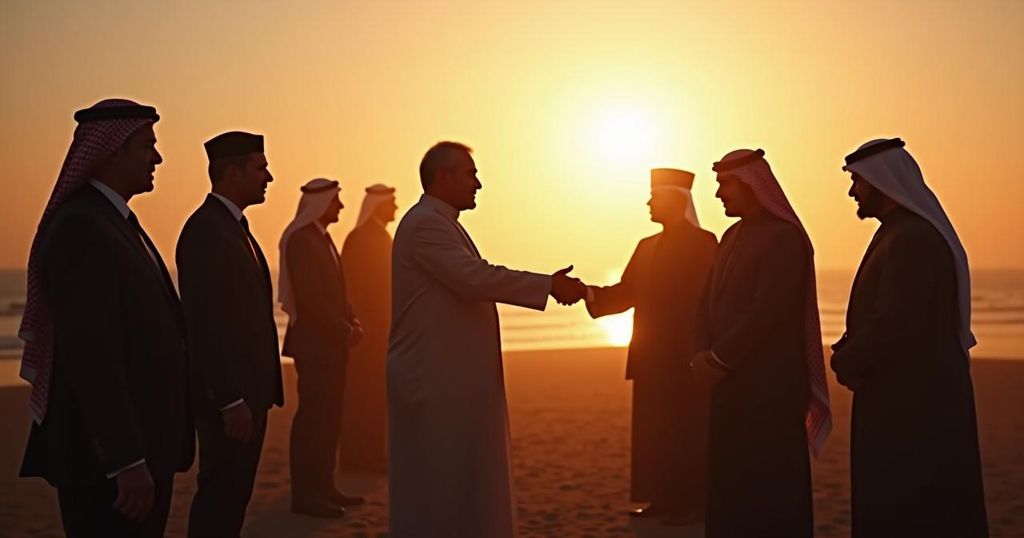Iran’s President Masoud Pezeshkian visits Qatar for the ACD Summit amid ongoing tensions in the Middle East, seeking to bolster diplomatic relations and engage in regional dialogues. Concurrently, Iran conducts joint military exercises with Oman, indicating a strategic partnership aimed at enhancing security and combat readiness. These developments are part of Iran’s broader efforts to unify regional allies against Israel and to strengthen its positioning within Asia.
The Iranian President, Masoud Pezeshkian, embarks on an official visit to Qatar on Wednesday, as reported by Iranian state media. This follows his recent return from New York, where he attended the UN General Assembly alongside a sizable Iranian delegation. Pezeshkian’s diplomatic agenda appears to be quite active, particularly as Iran seeks to strengthen its international relationships amidst ongoing tensions involving its proxies and Israel. In Doha, Pezeshkian will meet with the Emir of Qatar, Sheikh Tamim bin Hamad bin Khalifa Al Thani, and participate in the 19th Asian Cooperation Dialogue (ACD) Summit. His visit is in response to an official invitation and includes discussions between senior Iranian and Qatari delegations, along with a signing ceremony for cooperation agreements. Qatar has increasingly become a focal point for Hamas leaders and has voiced staunch criticism of Israel, particularly at the United Nations. Although the United States and its allies have approached Qatar to mediate a ceasefire between Hamas and Israel, the prospects for such a resolution appear diminished, and Qatar’s role in the region has shifted towards a more adversarial stance against Israel. Pezeshkian’s engagement with Qatar is part of Iran’s broader strategy to ally with nations like Turkey, Russia, and China in opposition to Israeli policies. Additionally, President Pezeshkian’s participation in the ACD, founded in 2002 with a goal to unify Asian countries in community-building efforts, highlights Iran’s focus on establishing economic alliances through organizations like BRICS and the Shanghai Cooperation Organization (SCO) as it deepens its ties with China and Russia. Parallel to Pezeshkian’s diplomatic activities, Iranian state media has reported joint military training exercises between Iranian ground forces and the military of Oman. Named Mountain Falcons 1 (Saqour al-Jabal 1), the exercise commenced earlier this week in Oman’s Jebel Al-Khader region. It involves collaboration between the Iranian Army and the Omani ground and air forces aiming to enhance operational readiness and combat capabilities. The relationship between Iran and Oman has historically been characterized by neutrality, with Oman often serving as a mediator in regional disputes, enabling its gradual integration with Iran in military exercises despite the nuanced implications this may have. Oman’s strategic position near Yemen allows it to balance its diplomatic actions amidst turmoil while remaining relatively stable, thereby positioning it as a surprising partner for joint military operations with Iran. Such training exercises could be viewed as Iran’s attempt to amplify its security influence in the Gulf region, although it is critical to note that the Iranian forces involved do not primarily align with the ideology of the Islamic Revolutionary Guard Corps. Overall, the Iranian president’s trip to Qatar, alongside military collaboration with Oman, indicates an intensified commitment from Iran to foster regional alliances while countering perceived threats posed by Israel and enhancing its security posture through diplomacy and mutual cooperation.
The article discusses President Masoud Pezeshkian’s diplomatic visit to Qatar against the backdrop of heightened tensions in the Middle East involving Iran and Israel. It examines regional dynamics, particularly Qatar’s shift towards a more hostile stance against Israel and Iran’s efforts to cultivate alliances with other major powers in Asia and its immediate neighbors. Iran’s military cooperation with Oman is presented as a strategic maneuver to project influence and stability in the region amidst ongoing conflicts.
President Pezeshkian’s upcoming visit to Qatar and the concurrent military exercises with Oman underscore Iran’s proactive efforts to consolidate alliances in an increasingly complex geopolitical landscape. By strengthening ties with Qatar and expanding military cooperation with Oman, Iran aims to enhance its regional influence and counteract Israeli actions. These developments reflect the strategic shifts occurring among Middle Eastern countries, as they navigate alliances and confrontations in response to regional tensions.
Original Source: www.jpost.com







